June 21, 2018
Edited by David Sanders
Specimen Days
1529—John Skelton, English poet, dies at about 69.
1913—Stefan Octavian Iosif, Romanian poet (Beautiful Irine), dies at 37.
1925—J. H. Leopold, Dutch poet (translated Omar Khayyam), dies at 60.
1940—Hendrik Marsman, Dutch poet/writer/critic, drowns at 40.
1945—Josef Hora, Czech writer/poet (Sinking Shadows), dies at 53.
1945—Adam Zagajewski, Polish philosopher, poet, is born.
1950—Anne Carson, Canadian poet, is born.
1999—Karl Krolow, German poet and translator, dies at 84.
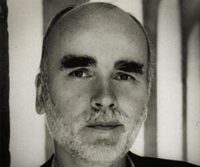
The bells pealed and the air vibrated, the cornets
of nuns sailed like schooners near
the theater, there was so much of the world that
it had to do encores over and over,
the audience was in frenzy and didn’t want
to leave the house.
—from “To Go to Lvov” by Adam Zagajewski, translated but Renata Gorczynski
“The bells pealed and the air vibrated, the cornets / of nuns sailed like schooners near / the theater” – Adam Zagajewski
World Poetry
Noted Irish Poet Macdara Woods Dies at Age 76
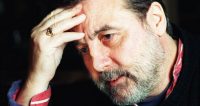
The poet Macdara Woods, who died on Friday at the age of 76, was regarded as one of the senior figures in Irish poetry. Dublin-born Woods was married to the current Ireland Professor of Poetry, Eiléan Ni Chuilleanáin with whom he was also a co-founder and editor of the literary journal Cyphers, named after one of his earliest sequences of poems.
Atheist Poet & Publisher Shahzahan Bachchu Killed in Bangladesh
A prominent Bangladeshi writer and publisher was dragged out of a shop and shot dead by unidentified attackers in central Bangladesh, ending a lull in the killings of secular bloggers and activists in the Muslim-majority country. Shahzahan Bachchu, 60, an outspoken proponent of secular principles and owner of a publishing house ‘Bishaka Prokashoni’ that specialised in publishing poetry, was gunned down in his ancestral village Kakaldi in Munshiganj district last evening by five assailants.
The poet Macdara Woods, who died on Friday at the age of 76, was regarded as one of the senior figures in Irish poetry.
Recent Reviews
Old Wounds
by William Logan
On Wi the Haill Voice: 25 Poems by Vladimir Mayakovsky, translated by Edwin Morgan, Night Sky with Exit Wounds by Ocean Vuong, The Astropastorals by Douglas Crase, A Memory of the Future by Elizabeth Spires, Stumbling Blocks: Roman Poems by Karl Kirchwey & Claude Before Time and Spaceby Claudia Emerson.
Michael O’Neill, Return of the Gift, Reviewed
by Ian Pople
In Sources of the Self, Charles Taylor comments that, for the Romantics, ‘The artist doesn’t imitate nature so much as he imitates the author of nature.’ Perhaps it is because Michael O’Neill has studied the Romantic poets for most of his academic career, that his own poetry seems to go out of its way to avoid such a stance. If Wordsworth’s ‘The Solitary Reaper’ seems possessed by the poet, O’Neill’s poetry seems like an attempt to always to allow the Other to drive the poems, to, almost, form O’Neill’s poems after their own kind. At the same time, it is clear that O’Neill is what he, himself, has called the ‘authorising consciousness’ of the poem. The ‘I’ in these poems is clearly the empirical O’Neill. O’Neill’s new book contains its fair share of elegies, and O’Neill has always been a fine elegist.
The Right Poetry Collection for Right Now: Terrance Hayes' 'American Sonnets for My Past and Future Assassin'
by Walton Muyumba
Now’s the time for “American Sonnets for My Past and Future Assassin,” Terrance Hayes’ electric, new book. In his five previous poetry collections — “Muscular Music” (1999), “Hip Logic” (2002), “Wind in a Box” (2006), the National Book Award-winning “Lighthead” (2010) and “How to Be Drawn” (2015) — Hayes innovates new poetic forms and hacks the codes of canonical containers, pimping them up dynamically. His writing demonstrates a serious commitment to revising, extending and advancing American poetry while recording, celebrating and mourning black American life. These aesthetic and intellectual preoccupations also charge “American Sonnets.”
Don’t Drink the Black Milk
by Hilary Plum
Ghayath Almadhoun’s Adrenalin is about living and dying in cities. I say “about” meaning not just the subjects with which the book is concerned—the cities of Damascus and Stockholm—but that the book circles or nears these cities, moves about them, approaches and reverses direction (about face). No matter your direction somehow the city defines your movements, a city at once here and beyond you. Almadhoun is, his bio tells us, “a Palestinian poet who was born in a refugee camp in Damascus in 1979”; “[he] has lived in Stockholm since 2008.” Adrenalin is his first appearance in English, in Catherine Cobham’s translation.
In Sources of the Self, Charles Taylor comments that, for the Romantics, “The artist doesn’t imitate nature so much as the author of nature.”
Broadsides
Turning Pages: The Mystery of the Disappearing Poetry
By Jane Sullivan
Agatha Christie was fond of dispatching her murder victims in the library, but have you heard of the vanishing poems in the library? It's a big mystery, and unlike the Christie tales, it's true. The mystery was unearthed when Melbourne poet Lisa Gorton rang Hawthorn public library to get a copy of David Malouf's first poetry collection, Bicycle and Other Poems. She knew they had at least one copy because she'd borrowed it four years before. But a friendly librarian told her it had been "deleted" from the catalogue.
Agatha Christie was fond of dispatching her murder victims in the library, but have you heard of the vanishing poems in the library?
Drafts & Fragments
Trauma Nurse’s Tribute to a Lost Soldier Wins Prince William's War Poem Competition to Remember our Wounded Military Heroes
by David Wilkes
In her work helping traumatised war veterans, nurse Debbie Lawson has heard many harrowing stories. But one touched her more than most. It came from a former member of a tank crew in Afghanistan, who saw his friends killed when their group was attacked. He helped bring their bodies back to base. Now at home in the UK, having left the Army, he believes he ‘sees’ his dead comrades every day.
In her work helping traumatised war veterans, nurse Debbie Lawson has heard many harrowing stories.
Poetry In the News
US Poet Laureate Urges Wellesley Grads to Teach the World to Love Itself

US poet laureate (and Pulitzer Prize winner) Tracy K. Smith had some words of wisdom for Wellesley College grads at the school’s commencement Friday. The Falmouth native, who won the Pulitzer for her 2011 collection, “Life on Mars,” closed her speech with a poem of her own and a challenge to the graduates: “I want you to teach the world you are right now inheriting to love itself in a way it does not yet believe that it can.”
US poet laureate Tracy K. Smith had some words of wisdom for Wellesley College grads at the school’s commencement Friday.
New Books
Stranger on Earth by Richard Jones
[Paperback] Copper Canyon Press, 328 pp., $20.00
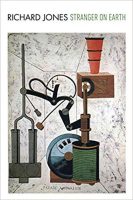
Richard Jones’s prodigious volume travels the wide arc of a lifetime in Proustian detail. He remembers a peripatetic upbringing, travels to London and Paris, separation from and reunion with his wife in the Italian countryside, morning tea with his daughter and trail runs with his sons, flights with a pioneering aviator father and conversations with a deaf mother. "Impossible task, staying alive," Jones writes, and yet a perspicacious examination of the life we have lived yields clarity and enrichment. Finding poetry in what went before, Stranger on Earth opens the door to what Proust calls "those dwelling-places deep within us that we would not have known how to enter."
North American Stadiums by Grady Chambers
[Hardcover]Milkweed Editions, 112 pp., $22.00
Winner of the inaugural Max Ritvo Poetry Prize, North American Stadiums is an assured debut collection about grace―the places we search for it, and the disjunction between what we seek and where we arrive. "You were supposed to find God here / the signs said." In these poems, hinterlands demand our close attention; overlooked places of industry become sites for pilgrimage; and history large and small―of a city, of a family, of a shirt―is unearthed. Here is a factory emptying for the day, a snowy road just past border patrol, a baseball game at dusk. Mile signs point us toward Pittsburgh, Syracuse, Salt Lake City, Chicago. And god is not the God expected, but the still moment amid movement: a field "lit like the heart / of the night," black stars stitched to the yellow sweatshirts of men in a crowd. A map "bleached / pale by time and weather," North American Stadiums is a collection at once resolutely unsentimental yet deeply tender, illuminating the historical forces that shape the places we inhabit and how those places, in turn, shape us.
Hera Lindsay Bird by Lindsay Hera Bird
[Paperback] Penguin UK, 112 pp., $12.88
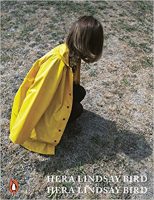
'Without doubt the most arresting and original new young poet, on the page and in performance' – Carol Ann Duffy A Sunday Times Book of the Year and New Zealand's best-selling collection, from the unstoppable force behind such poems as 'Monica' (the one from Friends) and 'Keats is Dead so F**k Me from Behind' this impressive debut has established Hera Lindsay Bird as a good girl…with many beneficial thoughts and feelings…… with themes as varied as snow and tears, the poems in this collection shine with the fantastic cream of who she is…juxtaposing many classical and modern breezes Bird turns her prescient eye on love and loss, and what emerges is like a helicopter in fog……or a bejewelled Christmas sleigh, gliding triumphantly through the contemporary aesthetic desert.
Divided by Linda Frank
[Paperback] James Street North Books, 100 pp.,$18.00
Looking deeply into humanity's interactions with the animal world, Linda Frank considers our fascination with and fear of nature, as well as our exploitation of all species. These poems catalogue not only the beautiful and sometimes deadly complexity of our natural world, but investigate the ways we have sought to understand it, highlighting the struggle of women scientists to push past misogyny. In these poems Nabokov's butterflies live on beside flea circuses and von Frisch's bees are as detailed as the habits of the jewel wasp. This is a collection written with a botanist's eye and a scientist's attention to cause and effect, both a lament and paean to a world that is vanishing.
Atmospheric Embroidery: Poems by Meena Alexander
[Paperback] Triquarterly, 112 pp., $17.95
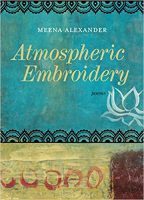
In this haunting collection of poems we travel through zones of violence to reach the crystalline depths of words: Meena Alexander writes, "So landscape becomes us, / Also an interior space bristling with light." At the heart of this book is the poem cycle "Indian Ocean Blues," a sustained meditation on the journey of the poet as a young child from India to Sudan. There are poems inspired by the drawings of children from war-torn Darfur and others set in present-day New York City. These sensual lyrics of body, memory, and place evoke the fragile, shifting nature of dwelling in our times.
“Without doubt the most arresting and original new young poet, on the page and in performance” – Carol Ann Duffy on Hera Linsday Bird.
Correspondences
Katharine Kilalea and Emily Berry in Conversation
by Katharine Kilalea & Emily Berry
Katharine Kilalea and Emily Berry discuss architecture, psychoanalysis and the different types of exposure that come with writing prose and poetry.
What’s Queer Form Anyway? An Interview with Maggie Nelson
by Annie DeWitt
Maggie Nelson defies classification. She is the author of nine books, spanning poetry, autobiography, art criticism, and theory. This week, Soft Skull Press has reissued her book of poetry, Something Bright, Then Holes. First published in 2007, Something Bright was Nelson’s fifth book, and she has not published a new book of poetry since. Nelson’s nexus is fluidity: gender, pleasure, desire, and the body are questioned with equal rigor as modality, criticality, and theory. Those concerns are present in Something Bright. “I don’t have to be ashamed of my desire / Not for sex, not for language,” the narrator tells us in “A Halo Over the Hospital.” But in this collection, Nelson’s heady, narcotic philosophizing is underpinned by a more personal vulnerability. “Live with your puny, vulnerable self / Live with her,” we are told.
The Problem of the Person Who Observes from a Distance: Talking to Rachel Galvin
by Andy Fitch

What constructive role can civilian authors play in creating a wartime literature? What might their mediated testimonies tell us more generally about what it means to write oneself into (or to be written to) lived social conflicts and large-scale human suffering? When I want to ask such questions, I pose them to Rachel Galvin. This present conversation (transcribed by Phoebe Kaufman) focuses on Galvin’s News of War: Civilian Poetry 1936-1945. Galvin has published two poetry collections, Pulleys & Locomotionand Elevated Threat Level (a finalist for the National Poetry Series, and for the Alice James Books’ Kinereth Gensler Award). Her translation of Raymond Queneau’s Hitting the Streets won the Scott Moncrieff Prize for Translation. She has co-edited, with Bonnie Costello, Auden at Work, and has co-translated, with Harris Feinsod, Decals: Complete Early Poetry of Oliverio Girondo. Galvin is an assistant professor of English at the University of Chicago.
A Writer’s Insight: Leah Poole Osowski
By Garrett Hazelwood
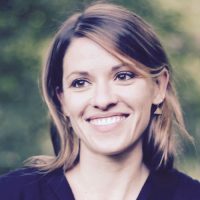
Leah Poole Osowski’s poems “Primary, Primal” and “With an Ear to the Earth” appear in the spring 2018 issue of The Southern Review. Here, she discusses wishing for mountain lions, the ways in which in her poems take shape, and the connection in her work between violence and liquid.
What constructive role can civilian authors play in creating a wartime literature?
Envoi: Editor’s Notes
Lessons from the Past: Adam Zagajewski
The first would be “intellectual curiosity” (but this is given or not), second — the same, intellectual curiosity. And the third — also. What else can you require from poets? You can’t recommend “talent” since this is really given; you could recommend “work” but what actually does “work” mean for a young poet? Sometimes idleness can be more fruitful, the capacity to be attentive, alert, without actually doing anything. If I’m stressing “intellectual curiosity” so strongly, it’s because I think many younger poets are undereducated, many tend to think that reading poetry, especially their contemporaries, is enough. But there is the huge edifice of learning: all the centuries of history, history of art, of music, et cetera. Nietzsche was against “historicism” in the sense of not being interested in the answer to the question “What is the world?” and only reading about what previous generations thought the world was. But this danger is minimal today.
Adam Zagajewski’s three skills for young poets: intellectual curiosity, intellectual curiosity, and intellectual curiosity.